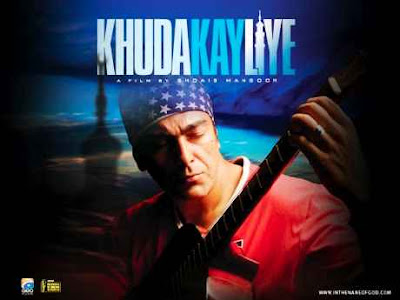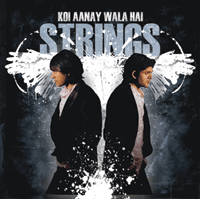
After the success of their debut single 'Aisi Taisi', Azal unveil their first album Road To Infinity
Maheen Sabeeh
Karachi
There is something extraordinary about 'Aisi Taisi'. It's extremely catchy and pertinent to our times. Aggressive in nature but melodic at the same time, it remains one of the few songs to come out in recent times that makes such a bold statement about the state of Pakistan where the system is stacked against the common man.
The people of Pakistan lapped it up. No romance, no frivolity but just the plain and simple truth. And that song remains Azal's trump card. It penetrated into the hearts and minds of people who have become accustomed to bubble-gum pop and heartbroken rock. The men in the video are also unique. Long haired, dark glasses, powerful vocals and an attitude that matches the single, the words that form 'Aisi Taisi'.
And now, after the super-success of their debut single, the men are back with their first album. And they are an interesting bunch. There are ET and Shabbi, who work behind the scenes in media and are well known to those in the media world. Then there is Sameer Ahmed who is a renowned bass player on the scene, also having played with the excellent band Awaz. And finally, the surprise packed in Azal is Rajab Ali Khan who is Ustad Zafar Ali Khan's son. Classically trained vocalist and in a rock band is a phenomenon that hasn't happened before. There was Fuzon, but they drew more from the classical and pop traditions than they did from rock music. For that reason amongst many others, it will be interesting to see where Azal go.
It's also interesting that two members of Azal, ET and Sameer are also working for Geo and Aag respectively. And while their album was initially slated to be released by another record company, they are now with Fire Records.
Present at the launch was Geo Television Network President Imran Aslam, CEO Fire Records Akbar Yazdani, Ustad Zafar Ali Khan, film actor Saud as well as three men from Azal, Rajab Ali Khan, Ehtesham Khan (ET) and Sameer Ahmed. The fourth, Shahbaz Ali Khan (Shabbi) was missing. He works at a media house in Dubai. They are basically four likeminded people who found each other and discovered a new sound to make together. 'Aisi Taisi' is the essence of this sound.
At the press conference, Azal launched their new video, 'Hum Tum' - a song that is a 360-degree turn for the band. Directed by Jalal and Amir (the duo behind 'Aisi Taisi' video), 'Hum Tum' is a light, soft yet extremely melodic ballad, a far cry from the in your face aggression of 'Aisi Taisi'. The video works as a great showcase for the band with its tones of blue, black and white and it has to be said that 'Hum Tum' is a beautiful song.
"Our album has flavours of the soil. You will not fight bhangra here or patriotism but you will find ballads. It is pop in genre but flavours that range from rock to club can be found," explained ET at the press conference.
One question that remained a concern with the creation of Azal was that barring Rajab, all three members have separate jobs. Sameer Ahmed, in fact, is a session player and while he is no longer with Karavan, his playing with other bands might make things difficult for the band. This is one of the reasons why Gumby and Noori could never work. Gumby was playing with other acts and according to Ali Noor, it affected the band.
"I don't think it'll be a problem. We've talked about it," said Sameer Ahmed at the press conference.
"Most of us do stuff besides Azal because as you all know concerts in Pakistan, in the last year and a half have become rare. Atta, ghee, petrol are the things that are on people's minds. Concerts are the only medium through which artists earn revenue. So other jobs are important to keep sustain us."
Instep Today caught up with ET to find out more on the band that is Azal and here's what he said…
Instep Today: Who does what in Azal?
Ehtesham Khan (ET): I am behind melodies, lyrics as well as vocals. Rajab Ali Khan comes from Gwalior family and is the grandson of Ustad Mubarak Ali Khan. He is the lead vocalist as well as writes melodies. Azal is the brainchild of Shahbaz Ali Khan. He is behing arrangements, sequencing and compositions. He is the producer of our album, Road to Infinity. Sameer Ahmed plays bass guitars, has played rhythm on the album and is the co-producer of our album. Azal is a unit and all of us are involved with the process of making this album.
Instep Today: Where did 'Aisi Taisi' stem from?
ET: Look at everything around us. We have the systems in place but they are not strong. It is about individuals, not systems. The poor are in bad shape and the rich don't care. The difference between them is money. When money comes in, suddenly the equation changes. The reason why 'Aisi Taisi' worked is primarily because of its honesty. The song was aimed at mass penetration and it managed to do so because people can relate to it.
Instep Today: When was Azal created?
ET: About five years ago. All of us come from the field of media, audio and visuals. I was working at a production house where Shahbaz was also working. For a project, we all worked together. It went well so we thought about a band. But we decided to live together for 2-3 years to see if the mental chemistry would work. What happens is that bands come out but they fade away because sooner or later, they stop communicating. This is not a band where one will play drums, one will sing etc. We are involved with everything together.
Instep Today: What does Azal mean?
ET: Azal is a Persian word that stands for "beginning".
Instep Today: As a new band, did you have to face problems?
ET: It's the same problem for everyone I think. The industry has no infrastructure. There is a huge communication gap between young and old musicians. We have talent but no avenue for its grooming.
Instep Today: Are there any plans of releasing the album in other markets such as India?
ET: Sangeet Records has released the album in US of A. Times India will release the album in India by mid-July. And from there we'll see.
We've got plans to hit England and India to promote the album in the pipeline.




